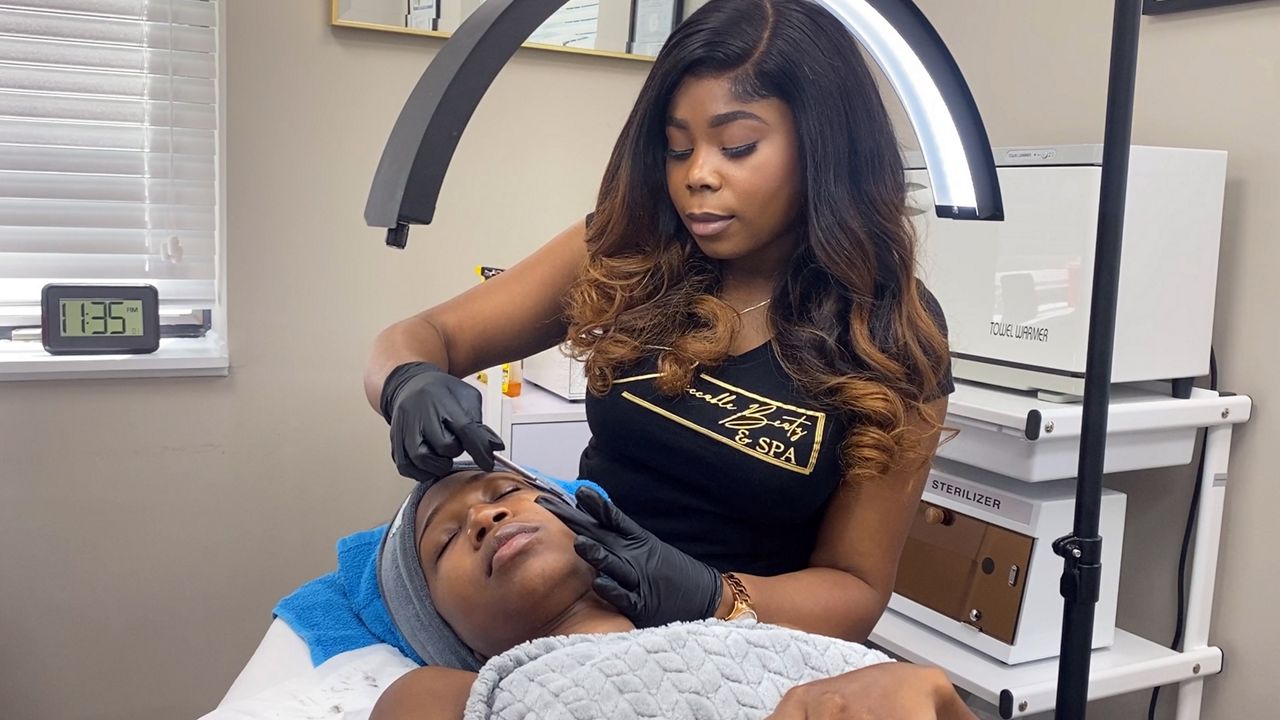Discovering the Function of Skin Specialists in Diagnosing and Dealing With Diverse Skin Problems With Precision
The area of dermatology plays a critical function in determining and managing a vast variety of skin problem that people might experience. From usual problems like acne and dermatitis to much more intricate disorders such as cancer malignancy or rare hereditary skin conditions, skin doctors go to the leading edge of diagnosing and dealing with these conditions with precision. With innovations in analysis tools and personalized therapy techniques, dermatologists are significantly able to customize interventions to private people' requirements - Chromaderm. Past the surface area of skin conditions lie interconnected aspects that affect medical diagnosis and treatment results. Comprehending the detailed internet of genetic, ecological, and way of life aspects that add to skin wellness is essential for comprehensive treatment.
Importance of Early Detection
Early discovery of skin problems plays an important role in the effective treatment and administration by skin doctors. Timely identification of skin issues permits prompt intervention, which can avoid the progression of conditions and minimize prospective problems. Skin specialists depend on their experience to identify refined adjustments in the skin that may suggest underlying issues, such as skin cancer, psoriasis, dermatitis, or dermatitis. By conducting comprehensive evaluations and utilizing analysis devices like biopsies or dermoscopy, skin doctors can properly detect a large range of skin disease.
Finding skin cancer cells in its very early phases substantially enhances the diagnosis and raises the probability of successful therapy results. Stressing the relevance of early discovery emphasizes the critical role that dermatologists play in promoting skin health and wellness.
Advanced Diagnostic Strategies
Making use of state-of-the-art technology and specialized experience, skin specialists utilize innovative analysis strategies to precisely determine and evaluate different skin disease. One of the key devices in the dermatologist's diagnostic arsenal is dermoscopy, a non-invasive method that enables the assessment of skin structures not noticeable to the naked eye. By magnifying the skin, dermoscopy help in the very early detection of melanoma, basic cell carcinoma, and various other skin cancers. Additionally, skin doctors might utilize confocal microscopy, a high-resolution imaging technique that allows them to picture skin at a cellular level without the need for a biopsy. This modern technology is especially helpful in detecting inflammatory skin problem and monitoring therapy efficiency.
Moreover, molecular testing has actually reinvented the diagnosis and treatment of skin diseases by making it possible for skin doctors to examine genetic anomalies associated with problems such as cancer malignancy and genetic dermatoses. Via strategies like polymerase domino effect (PCR) and next-generation sequencing (NGS), skin doctors can supply individualized therapy plans based upon a client's details genetic account. These advanced diagnostic devices enhance the accuracy and efficacy of skin-related care, inevitably resulting in better end results for individuals.

Tailored Therapy Methods
With an extensive understanding of skin conditions attained via innovative diagnostic techniques, skin doctors customize treatment approaches to address individual patient requires successfully. This customized approach is crucial in making certain ideal results for individuals with diverse skin problem. By considering elements such as skin kind, case history, way of life routines, and therapy choices, skin specialists can develop therapy strategies that are specifically tailored to every client.
Tailored treatment techniques may include a mix of treatments such as topical medications, oral drugs, minimally intrusive treatments, or way of life modifications. Individuals with acne may benefit from a routine that includes topical retinoids, oral antibiotics, and in-office treatments such as chemical peels or laser therapy. On the various other hand, individuals with dermatitis might need a therapy plan concentrated on gentle skin care routines, moisturizers, topical corticosteroids, and identifying and staying clear of triggers that intensify their problem.

Handling Chronic Skin Problem
Skin specialists play a crucial duty in establishing long-term monitoring strategies for persistent skin problem, ensuring reliable care and improved lifestyle for clients - Chromadermatology. Taking care of chronic skin problem needs a comprehensive technique that exceeds simply treating signs. Dermatologists are trained to not only detect these conditions properly however also to produce personalized therapy strategies that deal with the underlying reasons and factors adding to the skin problem's persistence
In handling persistent skin problem, skin specialists often utilize a mix of therapy modalities tailored per client's certain demands. This may include topical drugs, dental medications, way of life adjustments, and step-by-step treatments such as laser treatment or photo-therapy. Regular visit this web-site follow-up appointments are vital to check the condition's development, readjust treatment as needed, and provide continuous assistance and education to individuals.
In addition, dermatologists play a critical role in empowering clients to take an energetic role in managing their skin problem. By informing people concerning their problem, therapy options, and safety nets, skin doctors assist people make educated choices and grow healthy skin practices that contribute to lasting skin health and total wellness.
Collaborative Treatment Strategies
In the holistic monitoring of skin problem, joint treatment methods including various healthcare specialists are crucial for maximizing individual results. Skin doctors commonly operate in multidisciplinary teams to give extensive care that attends to the diverse demands of individuals with skin conditions. By teaming up with medical care doctors, allergists, cosmetic surgeons, and various other specialists, dermatologists can ensure that clients obtain incorporated and coordinated treatment tailored to their specific problem.
Collective care approaches also expand to individual education and learning and support. Skin doctors can work closely with pharmacists, nurses, and psycho therapists to inform patients concerning their skin disease, treatment choices, and safety nets. This interdisciplinary approach equips people to actively take part in their treatment and make informed decisions concerning their wellness.
Additionally, joint treatment permits for a much more all natural assessment of people, considering not just the physical signs and symptoms of their skin disease but additionally you could check here the emotional and social influence it might have. By considering the wider ramifications of skin conditions, medical care professionals can create a lot more customized therapy strategies that resolve the unique needs of each individual. Ultimately, joint care strategies play a crucial function in providing top notch, patient-centered look after people with varied skin conditions.
Verdict
Finally, dermatologists play an important duty in detecting and dealing with a large range of skin conditions with accuracy. Via early detection and advanced diagnostic strategies, they have the ability to supply tailored treatment approaches for ideal outcomes. By handling chronic skin disease and executing joint treatment strategies, dermatologists ensure extensive and effective look after their individuals. Their expertise and commitment add dramatically to the total health and health of people with varied skin issues.
Dermatologists depend on their knowledge to recognize refined changes in the skin that might suggest underlying problems, such as skin cancer cells, psoriasis, dermatitis, description or eczema. By multiplying the skin, dermoscopy help in the very early detection of melanoma, basic cell carcinoma, and other skin cancers.With an extensive understanding of skin conditions attained through sophisticated analysis strategies, skin doctors tailor therapy techniques to resolve individual client requires efficiently. Skin doctors are trained to not only detect these conditions properly but likewise to develop customized therapy strategies that address the underlying variables and causes contributing to the skin condition's determination.
In handling persistent skin problems, skin doctors frequently utilize a mix of therapy methods customized to each person's specific needs.